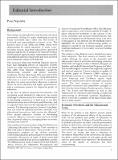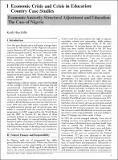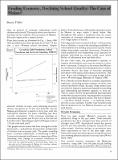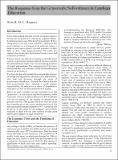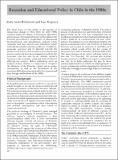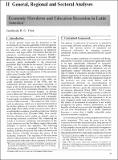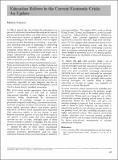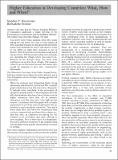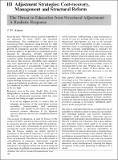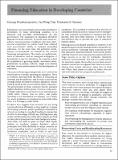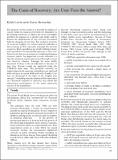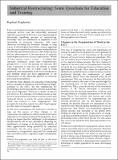Volume 20, Issue 1: Adjusting to Economic Crisis
Browse by
Recent Submissions
-
Editorial Introduction
(Institute of Development Studies, 01/01/1989) -
Economic Austerity Structural Adjustment and Education: The Case of Nigeria
(Institute of Development Studies, 01/01/1989)SUMMARY High rates of growth for foreign exchange and government revenues characterised the recent Nigerian economy up until 1982. Oil revenues then halved in one year and, in 1986, halved again. The initial responses ... -
Eroding Economy, Declining School Quality: The Case of Malawi
(Institute of Development Studies, 01/01/1989)SUMMARY Since 1980 harsh economic factors have hit Malawi: periodic drought and subsequent decline in crop output, falling world prices for export commodities, and an ever heavier debt burden. How have these economic ... -
The Response from the Grassroots: Self?reliance in Zambian Education
(Institute of Development Studies, 01/01/1989)SUMMARY This article examines the effects of the current economic crisis on education in Zambia, and argues that the crisis has mobilised a remarkable amount of energy among parents, administrators and teachers, which ... -
Recession and Educational Policy in Chile in the 1980s
(Institute of Development Studies, 01/01/1989)SUMMARY This article examines the impact of severe economic recession upon Chilean education in the early 1980s, with particular reference to the municipalisation and privatisation policies of the Pinochet government. The ... -
Economic Slowdown and Education Recession in Latin America
(Institute of Development Studies, 01/01/1989)SUMMARY This article argues that although under a normal economic environment the allocation of resources to education may not be influenced by economic conditions, a deterioration in such conditions, like the recent world ... -
Education Reform in the Current Economic Crisis: An Update
(Institute of Development Studies, 01/01/1989)SUMMARY Because of low economic growth rates, shifts in public spending from education to economic and military priorities, and rapidly growing school?age populations, many Third World countries are cutting educational ... -
Higher Education in Developing Countries: What, How and When?
(Institute of Development Studies, 01/01/1989)SUMMARY There is a major crisis of quality in higher education in developing countries due to economic recession, unchecked private demand, and political naivete about the functions of higher education. This crisis is ... -
The Threat to Education from Structural Adjustment: A Realistic Response
(Institute of Development Studies, 01/01/1989)SUMMARY This article sets out several of the measures which could and ought to be undertaken in the education sectors of LDCs, given that the imposition of structural adjustment programmes in many of these countries is ... -
Finacing Education in Developing Countries
(Institute of Development Studies, 01/01/1989)SUMMARY Adverse macroeconomic conditions and keen intersectoral competition for public funds have reduced the ability of LDC governments to continue expanding education. This article discusses three broad policy options ... -
The Costs of Recovery: Are User Fees the Answer?
(Institute of Development Studies, 01/01/1989)SUMMARY Recurrent support for school systems has deteriorated in both middle income and the poorest developing countries. Real expenditure per child is falling and spending on educational materials is often below levels ... -
Industrial Restructuring: Some Questions for Education and Training
(Institute of Development Studies, 01/01/1989)SUMMARY The industrially advanced countries are currently undergoing a significant change in the trajectory of their industrial development. This is associated with alterations in the way in which work is being organised. ...

